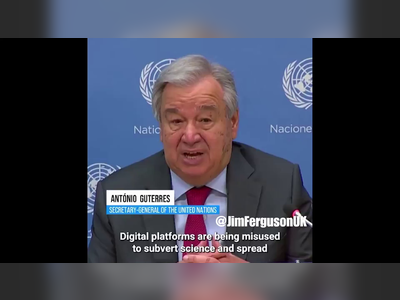Trump's Revived Greenland Proposal: Strategic Move or Geopolitical Risk?
The renewed focus of the U.S. president on Greenland underscores its strategic significance amidst escalating tensions with China and Russia.
When Donald Trump initially suggested buying Greenland in 2019, his proposal was mocked and quickly rejected, resulting in a canceled state visit to Denmark.
However, as he gears up for a possible second term in 2025, Trump has renewed his interest in the world's largest island, now seeing it as a vital element of his administration's strategic objectives.
In a recent interview, Trump hinted at the possibility of using force to acquire Greenland, showing a renewed resolve that includes his son, Don Jr., visiting the island with various representatives to emphasize the seriousness of his intentions.
Greenland's strategic importance, rich in critical minerals essential for energy technologies, has become clearer as global supply chains face disruptions, particularly because of China's increasing export restrictions.
The U.S. Department of Energy identifies these minerals as crucial for the future of energy production, making access to Greenland's resources highly valuable.
With China restricting mineral exports amid an ongoing trade war with the U.S., Greenland's resources could offer Washington greater security and reduce China's influence in global markets.
Additionally, Greenland's location is vital for U.S. defense.
The U.S. operates the Pituffik Space Base, an essential facility for missile early warning and space surveillance.
Expanding this base could enhance monitoring of Russian military activities in the Arctic and North Atlantic.
Trump's focus on securing U.S. sovereignty over Greenland is seen as a way to prevent rival powers, especially China, from gaining a foothold on the island.
This is particularly relevant as Greenland's movement towards independence raises concerns about potential increased foreign investment, including from China.
Trump's rhetoric, which includes possible tariffs on Danish exports and even the use of force to secure Greenland, has been rejected by Denmark and Greenland.
Key European allies, including France and Germany, have expressed their opposition.
Critics argue that Trump’s aggressive stance undermines U.S. relations with its NATO and European partners, further isolating the U.S. in its geopolitical strategy.
Trump’s 'America First' vision may be working against the unity of the Western alliance as it confronts growing threats from Russia and China.
While Greenland's strategic importance is undeniable, Trump's approach risks creating more divisions rather than enhancing U.S. security.
His focus on unilateral action to assert control over Greenland, rather than fostering multilateral cooperation, reflects a deeper shift in U.S. foreign policy, one that risks alienating longstanding allies and undermining global stability.
In a time of increasing geopolitical rivalry, the U.S. may find it cannot afford to act alone, and Trump's strategies could further damage the transatlantic relationship that has been central to Western power since the Cold War.
However, as he gears up for a possible second term in 2025, Trump has renewed his interest in the world's largest island, now seeing it as a vital element of his administration's strategic objectives.
In a recent interview, Trump hinted at the possibility of using force to acquire Greenland, showing a renewed resolve that includes his son, Don Jr., visiting the island with various representatives to emphasize the seriousness of his intentions.
Greenland's strategic importance, rich in critical minerals essential for energy technologies, has become clearer as global supply chains face disruptions, particularly because of China's increasing export restrictions.
The U.S. Department of Energy identifies these minerals as crucial for the future of energy production, making access to Greenland's resources highly valuable.
With China restricting mineral exports amid an ongoing trade war with the U.S., Greenland's resources could offer Washington greater security and reduce China's influence in global markets.
Additionally, Greenland's location is vital for U.S. defense.
The U.S. operates the Pituffik Space Base, an essential facility for missile early warning and space surveillance.
Expanding this base could enhance monitoring of Russian military activities in the Arctic and North Atlantic.
Trump's focus on securing U.S. sovereignty over Greenland is seen as a way to prevent rival powers, especially China, from gaining a foothold on the island.
This is particularly relevant as Greenland's movement towards independence raises concerns about potential increased foreign investment, including from China.
Trump's rhetoric, which includes possible tariffs on Danish exports and even the use of force to secure Greenland, has been rejected by Denmark and Greenland.
Key European allies, including France and Germany, have expressed their opposition.
Critics argue that Trump’s aggressive stance undermines U.S. relations with its NATO and European partners, further isolating the U.S. in its geopolitical strategy.
Trump’s 'America First' vision may be working against the unity of the Western alliance as it confronts growing threats from Russia and China.
While Greenland's strategic importance is undeniable, Trump's approach risks creating more divisions rather than enhancing U.S. security.
His focus on unilateral action to assert control over Greenland, rather than fostering multilateral cooperation, reflects a deeper shift in U.S. foreign policy, one that risks alienating longstanding allies and undermining global stability.
In a time of increasing geopolitical rivalry, the U.S. may find it cannot afford to act alone, and Trump's strategies could further damage the transatlantic relationship that has been central to Western power since the Cold War.
Translation:
Translated by AI
AI Disclaimer: An advanced artificial intelligence (AI) system generated the content of this page on its own. This innovative technology conducts extensive research from a variety of reliable sources, performs rigorous fact-checking and verification, cleans up and balances biased or manipulated content, and presents a minimal factual summary that is just enough yet essential for you to function as an informed and educated citizen. Please keep in mind, however, that this system is an evolving technology, and as a result, the article may contain accidental inaccuracies or errors. We urge you to help us improve our site by reporting any inaccuracies you find using the "Contact Us" link at the bottom of this page. Your helpful feedback helps us improve our system and deliver more precise content. When you find an article of interest here, please look for the full and extensive coverage of this topic in traditional news sources, as they are written by professional journalists that we try to support, not replace. We appreciate your understanding and assistance.













